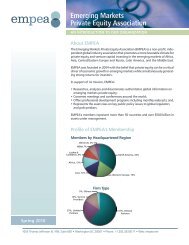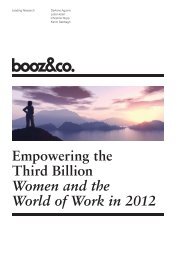Top 100 - Wamda.com
Top 100 - Wamda.com
Top 100 - Wamda.com
- No tags were found...
Create successful ePaper yourself
Turn your PDF publications into a flip-book with our unique Google optimized e-Paper software.
A Generational ShiftBrandZ <strong>Top</strong> <strong>100</strong> 2011: SECTORS/COMMENTARY 68By G. Walker Smith,Global Executive Chairman,The Futures CompanyMuch of what we believe aboutMillennials is wrong. But the onething that matters most we get right.Millennials have been trumpeted by pundits and heraldedby headlines as an optimistic, open, <strong>com</strong>mitted andsocially conscious generation, itching to step up andrescue the world from the mistakes and excesses ofgenerations past. Unfortunately, such pronouncementsare little more than wish-fulfillment by older observers.A careful assessment of longitudinal cohort data byThe Futures Company in its 2011 Unmasking Millennialsreport shows that Millennials are just like every othergeneration in their optimism and prosocial attitudes.As they age, these attitudes decline. By the time Millennialsreach their late twenties and early thirties, their attitudesare better described as those of adults than as those ofa distinct cohort. For many things, age is more importantand a better predictor than generation. But not foreverything, especially not technology.The generational divide that distinguishes Millennialsis one of technology. The technology revolution ofpersonalized <strong>com</strong>puting that first blossomed in the 1970shas been an everyday reality for Millennials. The same istrue for the Internet revolution that broke out in the mid-1990s. Millennials have <strong>com</strong>e of age steeped in a deeplywired, technologically sophisticated world that moves ata continually accelerating pace. Only older generationsremember something different and thus see today assomething special. For Millennials, this is just the waythings are.It is the experience of technology not simply the densityof technologies that makes Millennials different. By andlarge, older generations have approached technologyfrom an information point-of-view. For them, technologyis about processing data, for which productivity andefficiency are the key metrics. Not so Millennials.Certainly, information matters, but technology is moreabout connection. Technology is social. Information, infact, is managed and modulated through connections.For marketers, the technology divide across generationsis profound. Older consumers want information andentertainment from media. Millennials see media asplatforms for connection. Older generations have grownup directly interacting with marketing <strong>com</strong>munications,processing ads and making decisions individually.Millennials encounter marketing as part of their on-going,never-ending, constantly-evolving conversations aboutbrands, issues, celebrities, causes, sports, politics,music and more. Young consumers no longer encountermarketing in the ways embedded in traditional models ofmarketing, media, persuasion and attitude change.The old objective of marketers was to be heard abovethe noise. In effect, it was about out-shouting the<strong>com</strong>petition; hence, the relevant metric was share of voice.Today, and tomorrow, the objective must be one ofgetting talked about, for which the relevant metric willbe share of conversation.Millennials are an intensely social cohort for whominterconnection and engagement are fundamental.Though older generations will continue to hew to a moreindividualistic style, technology will force them to bemore social. In this way, at least, the world as a wholeis looking younger such that all generations will soon beable to claim that we are all Millennials.
















